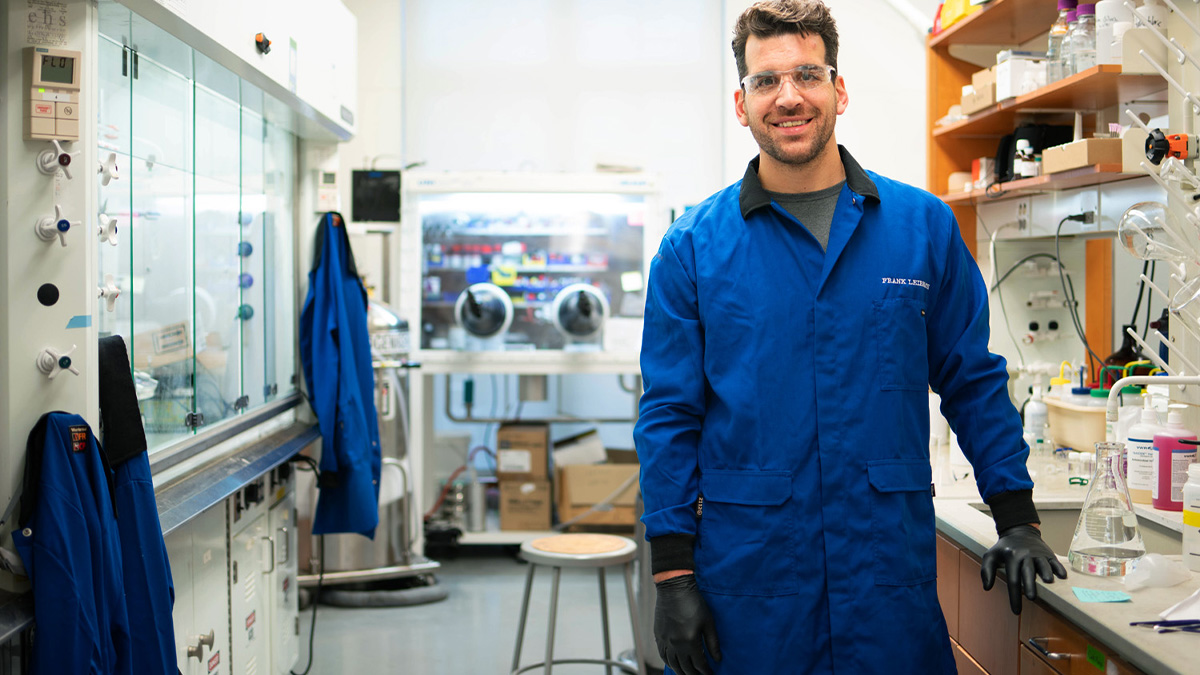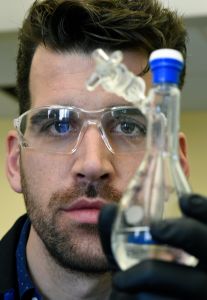Frank Leibfarth Awarded Prestigious 2025 Polymer Chemistry Lectureship

In 2016, Frank Leibfarth, Royce Murray Distinguished Term Professor of Chemistry, joined Carolina’s Chemistry Department, where he has built a research group focused on designing new synthetic methods for transforming simple starting materials into functional, sustainable plastics with extraordinary precision.
July 24, 2025 I By Dave DeFusco
In 2018, a young assistant professor at UNC-Chapel Hill published a paper in Polymer Chemistry as part of the journal’s “Emerging Investigators” collection. The study—his first as an independent researcher—combined flow chemistry and polymer synthesis, offering a new direction for how complex plastics could be made more efficiently and precisely.
Seven years later, that same professor, Frank Leibfarth, the Royce Murray Distinguished Term Professor of Chemistry, has been awarded the 2025 Polymer Chemistry Lectureship, one of the field’s most prestigious honors for early-career scientists. Selected by the journal’s editorial board from a global pool of nominees, the award recognizes researchers who are redefining the boundaries of polymer science.
It’s a fitting arc for a chemist whose work sits at the cutting edge of sustainable materials science and who still looks back on that first paper with pride.
“Seeing it published gave our nascent group so much confidence that we were moving in the right direction,” said Leibfarth. “It was also the first study in our group that combined flow chemistry and polymer chemistry, which is still an area of active research almost nine years later.”

Leibfarth’s journey to the forefront of polymer chemistry began far from Chapel Hill. A native of South Dakota, he studied chemistry and physics at the University of South Dakota, earning the prestigious Goldwater Scholarship before graduating in 2008. That same year, he began a Ph.D. at the University of California, Santa Barbara, under the mentorship of Craig Hawker, one of the world’s most respected polymer scientists.
After completing his doctorate, he accepted a National Science Foundation Fellowship to conduct postdoctoral research at MIT with Timothy Jamison. There, he deepened his interest in continuous flow chemistry, an approach that would become central to his later work.
In 2016, he joined Carolina’s Chemistry Department, where he has built a research group focused on designing new synthetic methods for transforming simple starting materials into functional, sustainable plastics with extraordinary precision.
Polymers—the large, repeating molecules that make up plastics—are deceptively complex. Their properties are shaped not just by the atoms that make them up, but by how those atoms are arranged, folded and entangled across multiple scales.
“Plastics are kind of cool because you can hold them in your hand, push and pull them, and you can actually feel how these molecular changes manifest into actual properties,” said Leibfarth. “But at the core, it all comes down to fundamental chemistry—how we make them.”
Leibfarth’s lab blends polymer chemistry, organic synthesis and continuous flow chemistry, an interdisciplinary toolkit that allows for greater control over the molecular design of materials. Flow chemistry, in particular, has enabled automation of polymer production and opened doors to machine learning applications.
“The dream is that someone who isn’t even a synthetic chemistry expert can walk up to a computer, type in a few commands and have polymers made for them,” he said.
His team has already used this combination of automation and machine learning to design materials for real-world applications. In one study, they developed new MRI imaging agents capable of detecting hypoxia, or low oxygen levels. In another, they created ultra-tough resins for 3D printing. These breakthroughs stem from the same foundational work published in Polymer Chemistry nearly a decade ago.
Despite the technical nature of his research, Leibfarth remains focused on the big picture: addressing global challenges like plastic waste, carbon emissions and environmental health.
“Today’s materials won’t solve tomorrow’s challenges,” he said. “If we want to develop sustainable materials for everything from packaging to biomedicine, we need to build them from the bottom up.”
That means redesigning plastics not just for performance, but for circularity. Leibfarth believes the field must shift from a “take-make-waste” model to one where materials are reused, repurposed and reintegrated into the economy.
“The biggest challenge we face is switching plastics from a linear workflow into a circular one,” he said. “That requires new science, new technology and a new mindset.”
He notes that the sheer volume at which society produces plastics today represents a kind of unrecognized carbon-fixation strategy. If people can learn to manage and reuse those materials responsibly, the environmental benefits could be enormous.
Leibfarth’s work has already earned widespread recognition. In addition to the Polymer Chemistry Lectureship, he has received the Beckman Young Investigator Award, a Sloan Research Fellowship and the Presidential Early Career Award for Scientists and Engineers, and was named to Popular Science’s “Brilliant Ten.”
At UNC, he’s just as celebrated for his teaching, having won the Tanner Award for Excellence in Undergraduate Teaching and serving as the university’s 2021 winter commencement speaker.
Looking ahead, Leibfarth envisions a future where automated chemistry, machine learning and interdisciplinary collaboration allow researchers to design sustainable materials with speed and precision. But even as the tools evolve, the mission remains constant.
“We try to advance the field with every paper we publish,” he said. “We still try to be as creative as possible, question everything and get better every day.”

